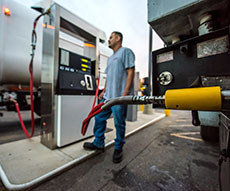Natural Gas Vehicle Maintenance and Safety
Natural gas vehicles (NGVs) use a spark-ignited engine, similar to conventional gasoline-fueled vehicles, and have a fuel system designed for natural gas fuel. Typical engine modifications for NGVs include hardened exhaust valves and valve seats, but these modifications do not change the visual appearance of the engine, nor do they change the engine's maintenance and service requirements.
An ongoing Sandia National Laboratories’ project focuses on modeling unexpected natural gas releases in vehicle maintenance facilities, which will inform the development of safety codes and educational materials. For more information about compressed natural gas (CNG) vehicle maintenance facility protection, see the Compressed Natural Gas Vehicle Maintenance Facility Modification Handbook.
CNG Tanks and Fuel System
Modern vehicles have sophisticated fuel systems designed to store and deliver precise amounts of fuel to the engine to maximize performance and minimize harmful emissions. NGVs are no different—but the fuel storage and delivery system may look and operate differently than those of conventionally fueled vehicles. NGV system maintenance differs, too. The most important added maintenance requirement for NGVs is to have the fuel storage tanks inspected at regular intervals, after accidents, or when there is suspected damage. It is also critical to know the end-of-life date of the tank so it is properly decommissioned at the end of its useful life. For more information, see:
- Video: Compressed Natural Gas Fuel Tank Defueling, Decommissioning, and Disposal
- The CSA Group's NGV 6.1-2021, a best practices document for compressed natural gas fuel storage and delivery systems for road vehicles.
Oil-Change Intervals
Natural gas tends to extend the useful life of the engine's lubricating oil because it produces less carbon when burned. In conventionally fueled vehicles, engine oil degrades as a result of soot and other impurities from the combustion process that are then absorbed by the oil. NGV owners should consult their vehicle's maintenance manual for the proper oil-change interval. For vehicles that have been converted from gasoline to natural gas, it's still best to follow the original maintenance schedule, particularly if the engine is under warranty. Fleet managers may find it economical to send oil samples to a laboratory for testing, to understand the maximum useful lifetime for each oil change.
Ignition Systems
Most natural gas engines use spark plugs to ignite the fuel, similar to gasoline. However, natural gas is much more sensitive to spark quality and voltage. Therefore, it is critical that all parts of the ignition system (spark plugs, wires, coils, etc.) are properly maintained and protected from excessive heat and other damage. NGV owners should consult their vehicle's maintenance manual for the proper interval for inspecting and changing ignition parts. Note that some manufacturers produce spark plugs, ignition wires, and even engine oils that are specifically designed for use in NGVs. These will help to maximize the vehicle’s performance and engine life.
